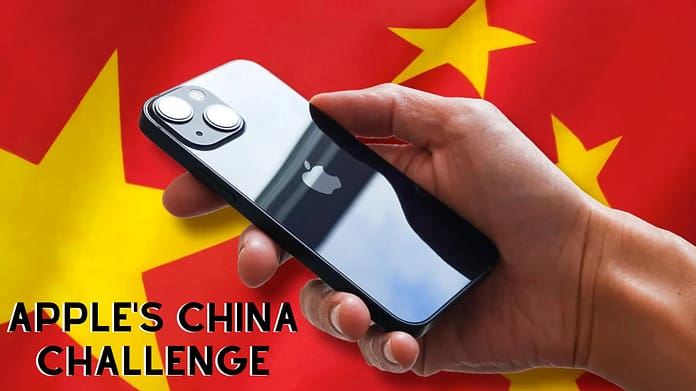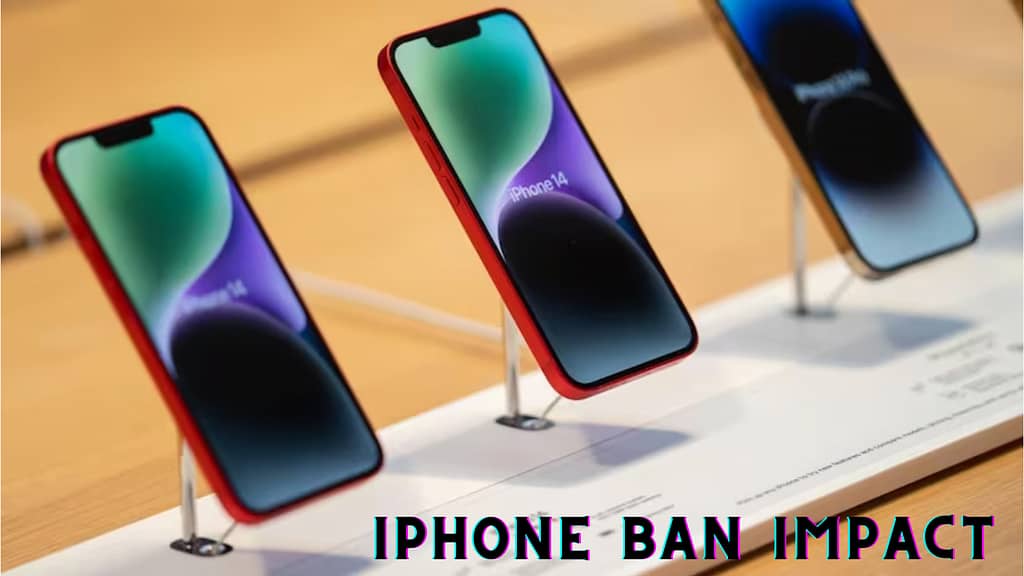In the last couple of days, the company’s stock market value has dropped by more than 6%, which is roughly around $200 billion (£160 billion).
Table of Contents
China’s iPhone Ban: Biting Apple’s Fortune
China represents the third-largest tech market globally, contributing to 18% of its total revenue last year.
It’s also the primary location where the majority of Apple’s products are manufactured, primarily by its biggest supplier, Foxconn.
According to a report from The Wall Street Journal (WSJ) on Wednesday, Beijing has issued an order instructing officials of central government agencies not to bring iPhones to their workplaces or use them for work purposes.
The following day, Bloomberg News disclosed that this ban could potentially extend to employees of state-owned companies and government-supported agencies as well.
Sources have informed WSJ that officials have been instructed not to use iPhones, a directive that was given by their superiors in recent weeks. Restrictions have also been imposed on other foreign-brand devices.
According to the newspaper, there were pre-existing bans on iPhones in certain agencies, but insiders indicate that these restrictions have been recently broadened.
The extent to which these instructions were widely communicated through Chinese authorities remains unclear. These reports have come out ahead of the anticipated release of the iPhone 15, scheduled for September 12th.
A few people on Chinese social media platforms have mentioned that they are employed by state-owned companies and have been instructed to discontinue the use of Apple devices by the end of September. In a somewhat humorous tone, one of them quipped about their financial situation, saying they can’t afford a new phone and asked, “What am I supposed to use for work?” They expressed their astonishment.
China stands as one of Apple’s major markets, and it’s also the place where iPhones are made, though Apple has recently expanded its production efforts in India. In reaction to the reports, there has been no formal statement issued by the Chinese government.
Apple didn’t promptly respond to the BBC’s inquiry for a comment.
Subsequent Effects
In addition to the drop in Apple’s stock prices, the stocks of a few of its suppliers were impacted as well.
On Thursday, Qualcomm, the largest supplier of smartphone chips worldwide, experienced a more than 7% reduction in its stock shares. Meanwhile, SK Hynix, a South Korean company, observed a roughly 4% decrease in its shares on Friday.
Tensions in the technology sector have been escalating between the United States and China, resulting in both parties implementing various restrictions.
This year, the United States, in conjunction with its partners Japan and the Netherlands, has placed limitations on the export of specific chip technologies to China, effectively restricting its access to these technologies.
In response, China has taken countermeasures by prohibiting the export of critical materials essential for the semiconductor industry. Beijing is said to be preparing a fresh investment fund of $40 billion to promote the growth of its chip manufacturing sector.
During Commerce Secretary Gina Raimondo’s recent trip to Beijing, there was an unexpected introduction of the Mate 60 Pro smartphone by the renowned Chinese tech company Huawei.
The Apple initiated the pre-sale of the Pro+ model of the phone on a Friday.
A Canadian technology research company, TechInsights, has reported the presence of a fresh 5G Kirin 9000s processor in the smartphone. This processor was developed by SMIC, China’s leading contract chip manufacturer, specifically for Huawei.
Dan Hutchinson, an analyst at TechInsights, mentioned that this “illustrates the technological progress achieved by the semiconductor industry in China.”
This week, Mike Gallagher, a U.S. Congressman serving as the head of the Senate Committee on Commerce, issued a request to restrict and impose sanctions on the export of Huawei and SMIC.
Security Apple Revision
In the midst of this situation, Apple took swift action on Thursday in response to the identification of security vulnerabilities exploited by unidentified hackers, issuing a critical software update for a significant range of both older and current devices.
This update was rolled out when Citizen Lab’s digital rights investigators identified that attackers were compromising Apple devices using a unique and previously unknown technique to pursue specific objectives.
Apple encountered a situation resembling “exploitation,” prompting the company to release two updates swiftly as an integral part of their immediate customer security response.
This year, Apple finds itself compelled to issue comprehensive security updates for the 15th time.



